I leave Toubab Dialaw rather late as my next spot is Warang just near Mbour, where I was offered to stay the night in the house of Maryse and Toni. I had met them at the Tropic of Cancer sign in the Sahara, in the middle of nowhere. I avoid the main road going into Mbour by taking a smaller one to Saly. In the small villages on the way, I am spotted twice, by a young man who saw me in Mboro a week ago, and by a girl on a horse cart shouting “he stayed with the sisters in Dakar“, two days ago. That is for the “small world” moment of the trip.
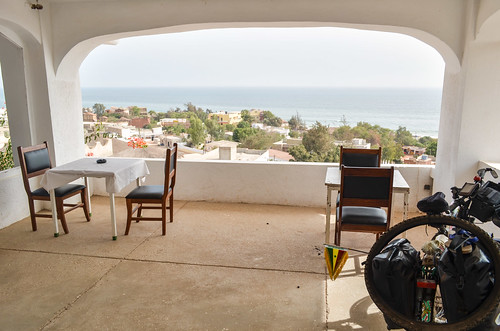
Saly is touching Mbour on the Petite Côte and as I slowly enter the small town, it looks more and more like a giant Club Med. There are holiday residences everywhere, restaurants and clubs, and Toubabs driving 4×4, either in family, either in couple competing for the greatest age difference. Surely life with a French pension is much better here than in the long winter of Europe.
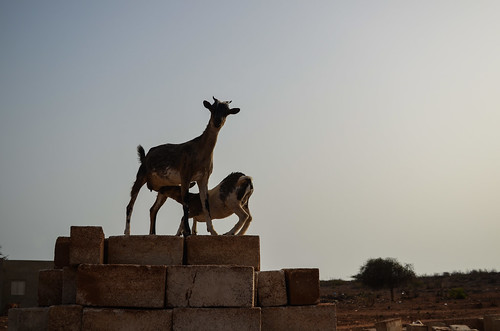
Surprised by the sand roads in Saly, Mbour, and distances longer than expected, I cycle the last 5 kilometers at night on the main national road, something better avoided, to reach Warang and Babacar for a warm welcome. Munich just won the Champion’s League, and it would probably have been louder in the streets if Barcelona and Madrid were playnig the final instead.

The next day will be another short riding day as I’m staying late and have a Sunday family lunch with Babacar.
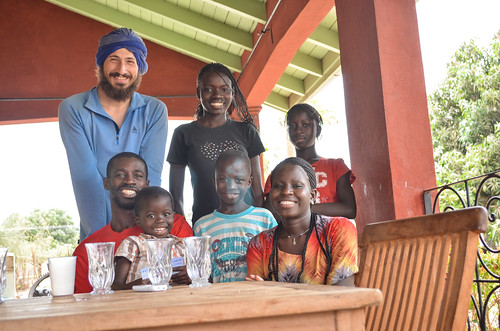
I continue along the Atlantic coast. This part of the Petite Côte is more natural than above Mbour. There are still many holiday camps and restaurants, but without the tourists.

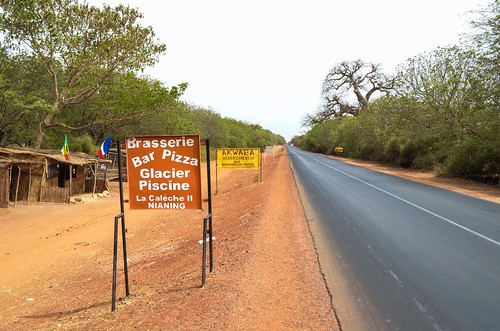
The area I am now reaching is Christian. It is the homeland of Senghor, the first Senegalese president. As I’ve passed through Kébémer, Louga, and soon Fatick, I can boast of having visited the hometowns of all the presidents of Senegal.
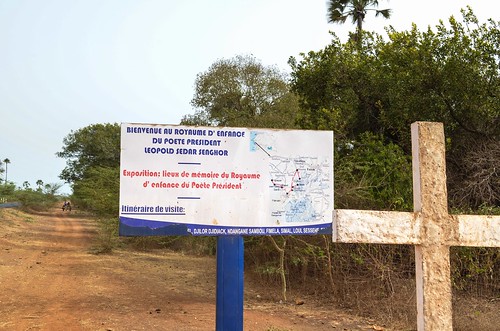

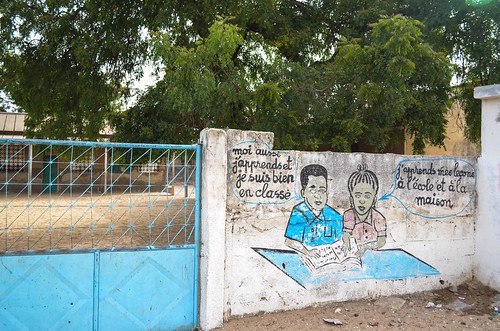
Joal is a modest town like many in Senegal. Its particularity lies in the small island of Fadiout, linked to Joal by a bridge. The island is covered by clam shells. There is a rather big church, and many souvenir shops called after supermarket names.


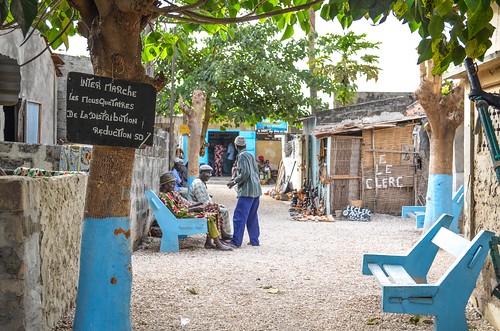



Another bridge is connected from Fadiout to another island, a tiny one, which is in fact a cemetary. Christians and Muslims are buried at (almost) the same place.
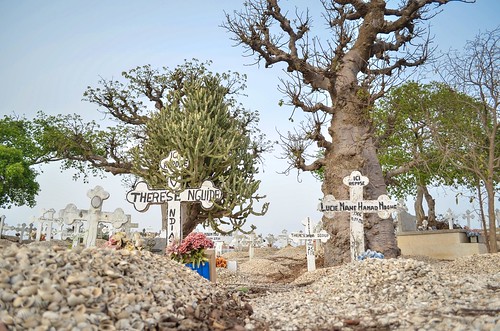
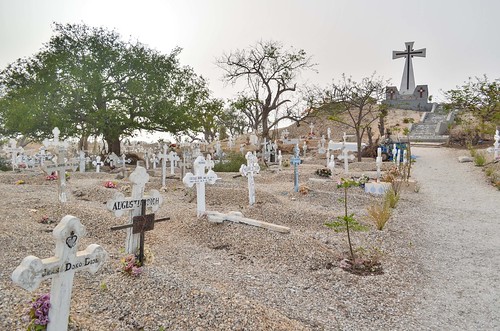
I don’t have to return to Joal as I can cycle from the cemetary island back to the mainland. There is a sand piste going between waters and baobabs. Although it can look from Google Maps that I’m cycling in the water or through the mangrove, it’s working pretty well and I am back on the road to the south. I am struggling in patches of sand and have to sleep before my destination objective. I wanted to reach Palmarin, right where the Saloum river meets the Atlantic ocean. It is still 20 km away, so I am setting up my mosquito net under the entrance porch of the school of Kobongoye II. In Senegal the villages close together are often called after one single name and a number.


In order to leave before the kids go to school and start studying my presence here, I wake up early and am already on the saddle by 7:30.
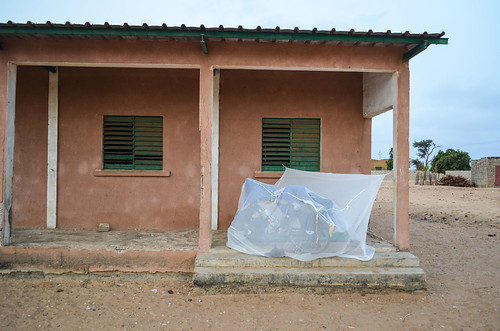
The piste is still bad through Samba Dia until Fimla. I get to buy my breakfast, a café Touba and a sandwich of warm haricots, with the early villagers. I am in Fimla at the border with the Saloum river. The Saloum delta is a huge area covered with mangrove. Fishermen venture there with their pirogues, and it should be possible to hire one to take me across, to Foundiougne. But when I see the state of the pirogues, and considering the amount of petrol to sail there and back, I find it safer to go around by the road and take the ferry to Foundiougne. Cycling around the big delta means 100 km extra.

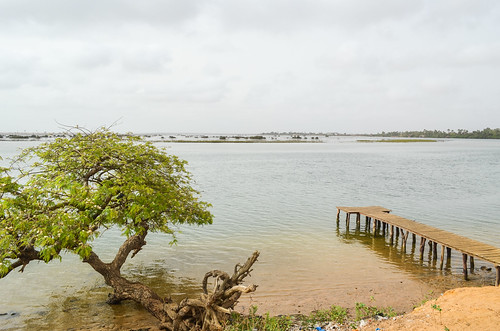
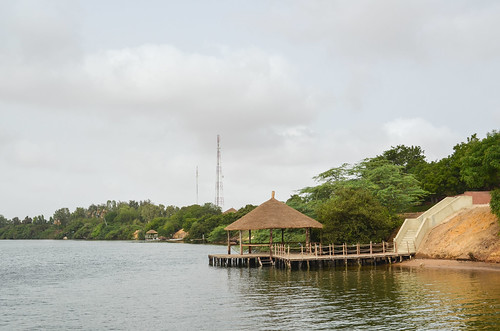
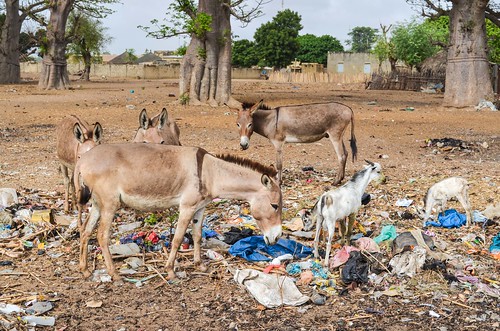
The road back to Fatick is sometimes of a brand new asphalt, sometimes very bad. The mango sellers are creating a mini town at the major crossroads. The women are selling buckets of mangoes, and all run to the buses who stop there. As I was told that I can just pick them off the trees in Casamance, I will wait a bit longer.
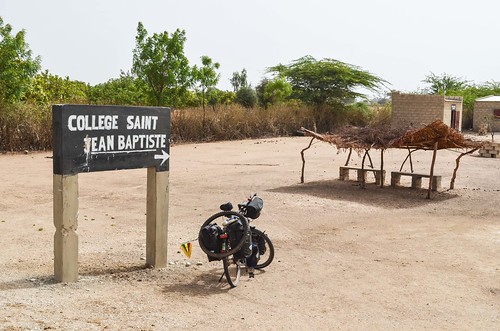
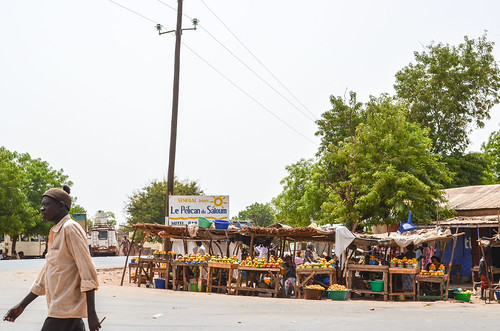
The road to Foundiougne, which shouldn’t be popular in normal times as it is longer than the main one through Kaolack and has a ferry crossing, is deserted, probably because the ferry is not running. I was already warned twice that it is broken, but also that pirogues do the trip and can load motorbikes. So I am taking the road anyway, expecting to see beautiful landscapes of mangroves. However, I am only rewarded by tones of yellow, a headwind and very hot temperatures.
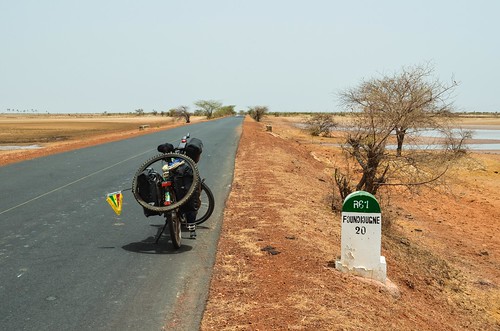
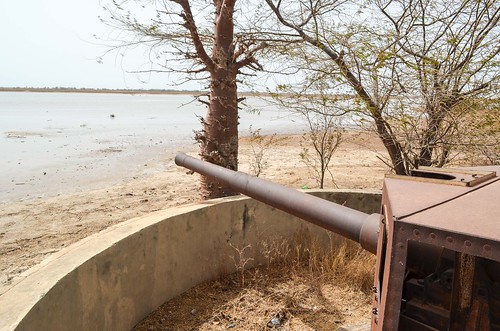
Finally, I won’t have to take the pirogues since the military run a basic but efficient service, for less than a euro for the bike and me. The South Koreans of Samsung are building a new pier and I don’t wait much until I can embark for the 1 km crossing of the Saloum river.
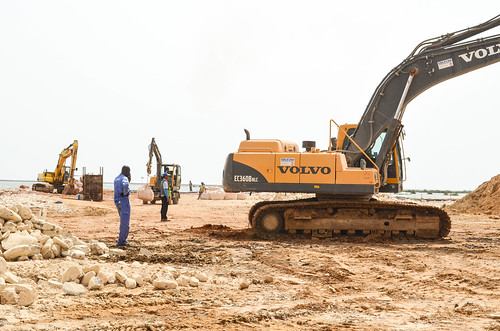
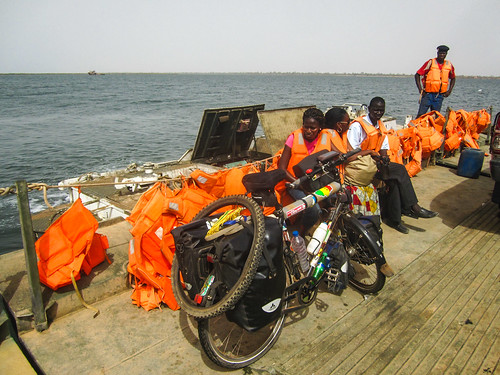
Once on the other side, in Foundiougne town, which has the worst water I got to drink in Senegal, I call the Carmen Brothers to announce I will be reaching their convent tonight. That was without knowing the state of the road ahead…
From Foundiougne to Passy and Ndiafatte, the piste might be good enough for cars but the corrugated iron surface prevents me from going above 10 km/h.




I finally make it at night after 160 km, a very long distance considering the several sections of piste. The last trick of the day is to watch for snakes are I cycle around the compound fence. After their warm welcome, the brothers are supposed to observe silence in the evenings, but we have a nice chat before I get my deserved sleep.
The next day is a short cycling one: a long chat at the convent and a long visit of the salins of Kaolack make most of it. The brothers directed me to Matthieu who manages the production of salt and we went for a drive between the salt pools. Kaolack is on the Saloum river, into which the sea enters, making the delta a high salinity environment.

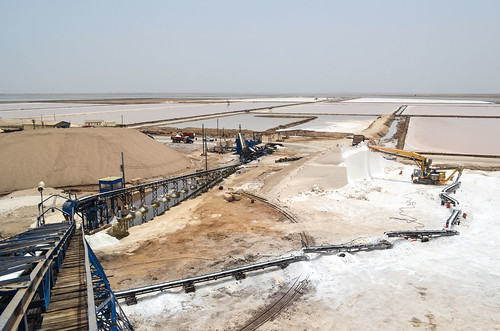

In order to reach Gambia, on the Banjul side, I must return to Passy where I was yesterday. I chose to take a long way around, through Keur Soce, on a brand new paved road for the first half, and a piste for the second half. It is a bit sandy but better than the destroyed road awaiting reconstruction.
I had spotted a campment in Passy. I know it won’t bring me an experience as good as camping anywhere else, but going there spares me from looking for a place to sleep.
As expected, the campment is empty (low season). The owner is not really friendly and seems to be better without guests. Since it’s night already, I just ask the neighboring restaurant if I can sleep in the backyard. Marie, the cook, accepts, and it happens she hosted a German cyclist about 2 weeks ago. It must be Johannes I met in the Liberian embassy in Dakar.
On another note, it’s almost too easy to cycle in Senegal: even if I wait until the last minute of daylight to find a camp spot, people would never refuse to let me camp by their house, and often provide a bucket of water to shower and/or food.
If I can protect from flies and mosquitoes with a net, there is little to do against the worst disturbance during my sleep: it is 3:46 am the the rooster on a tree branch almost above my head starts singing. Another one in the village is responding. The dogs are joining the nocturnal pointless celebration and I have to wait to be fed up and tired enough to find sleep again, until late morning.
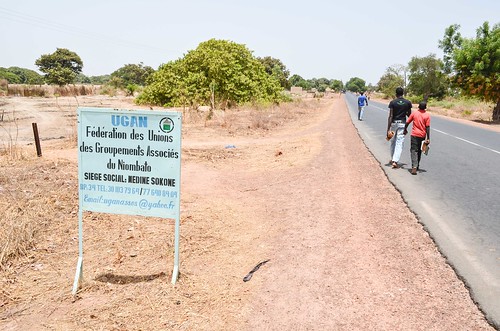
A tuna onion sandwich later, and I am ready to hit the road until The Gambia. My stops are in Sokone and Tambacouta, linked by the same destroyed road as between Passy and Ndiafatte. Tambacouta is a pleasant village, right on the edge of the Saloum delta, on the south side this time. There is a strong tourist infrastructure but because of the low season, it looks more or less abandoned.

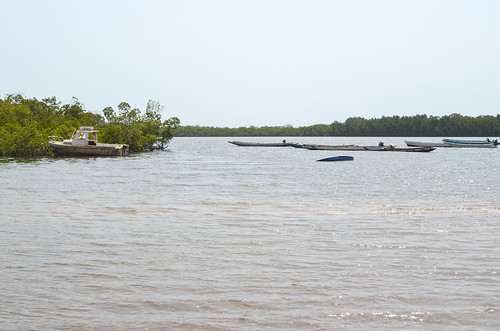
I am cycling the last kilometers in Senegal before the Gambian border, but I will be back in Casamance before Guinea-Bissau. A quick look at a map and the Gambian border reveals the utter nonsense of colonial divisions for the people today. Trials to bring Senegal and Gambia together have failed.
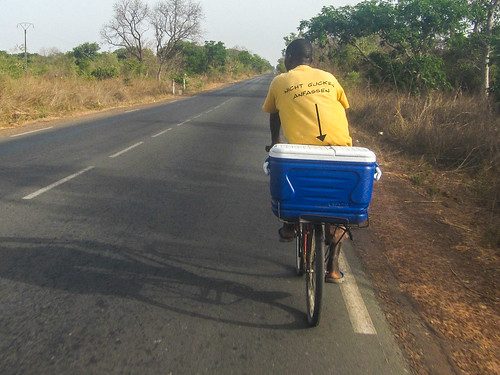
When arriving at the border post in Karang, I am chased by a bunch of ladies, each one carrying a big wad of banknotes. This is because The Gambia (for some reason the country is called “The Gambia” and not simply “Gambia”) is not part of the CFA Franc community. I escape the ladies but also miss the Senegal police station. The exit is done quickly, but the entry is not the same: two young men without uniforms say they will search through my luggage behind the customs building. I don’t carry much compared to what can be transported in a car, but looking into each and every bag takes a fair amount of time. They want to see absolutely everything. They are the police (the secret one, without uniform), and they do their job too well, remaining polite and without asking any bribe.
Then came the topic of the visa: I knew that it would be cheaper to buy it at the border rather than asking it at the embassy in Dakar, but I never got the right price quoted. On the internet, I read about a price to bargain down to 7000 CFA. Kuku, who passed before me, paid 1250 dalasi. I am asked 1000 dalasi. It’s hard to bargain the price of a visa with the officials, I guess it happens especially when people want to cross Gambia until Casamance without visiting it and exit the same day. In that case, an agreement with Senegal exists so that the “passers-by” don’t pay anything, but the Gambian police would make them pay for a visa anyway. There’s little doubt about where the money of the visas purchased at the border ends …
The most surprising is that travelers who land in Gambia by air do not need a visa (or maybe sometimes). Well, these Gambian visa rules are just funny. And all in all, it’s still cheap (1000 dalasi = 20 €) compared to the neighboring countries.
However, even if I had enough time when I first entered the police station, I am now left on the Gambian territory at 19:40, and it will be very dark in a few minutes. I don’t like to enter a new country in the wrong conditions, and it’s the case now. There’s nothing to sleep at and it’s too dark to find a camp spot. As I try to escape Amdalai, the Gambian border village, I realize soon that it’s night and I don’t know where I’m going.
Fortunately, the first man by the mosque answers my worries by taking me to his place, offering the rest of thieboudiene (I ate more thieboudienne than anything else since I entered Senegal) and the room of his son.
Keba’s family is Wolof, the parents grew up in Senegal and the two children in Gambia. Which means they speak Wolof together, I speak French to them, and English with the son. Happy and relieved to spend the night safely, and to notice that Musa is very focused on keeping his first rank at school, we spend the evening reviewing the divisions and other maths exercises.








Leave a Reply